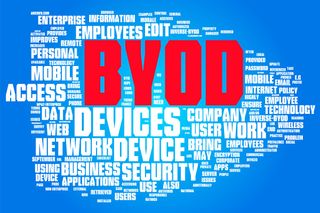Surge in BYOD sees 7/10 employees using their own devices
Ovum study shows that BYOD is here to stay.

Nearly 70 per cent of employees who own a smartphone or tablet choose to use it to access corporate data, according data gather by research firm Ovum.
The study of 4,371 employees worldwide found that corporate BYOD activity by full-time employees (FTEs) remains steady at almost 60 per cent over the past two years.
The results have led Ovum to warn CIOs and business leaders to "respond and adapt now to this change in employee behaviour, rather than being steamrollered by it."
"Trying to stand in the path of consumerised mobility is likely to be a damaging and futile exercise," says Richard Absalom, consumer impact technology analyst at Ovum.
"We believe businesses are better served by exploiting this behaviour to increase employee engagement and productivity, and promote the benefits of enterprise mobility."
The research also showed that the tablet market continues to grow, and with personal tablet ownership by full time staff rising from 28.4 per cent to 44.5 per cent over the last 12 months.
Ovum said that this activity would continue regardless of whether a CIO wants it or not. Ovum found that 67.8 per cent of smartphone-owning employees bring their own smartphone to work, and 15.4 per cent of these do so without the IT department's knowledge and 20.9 per cent do so in spite of an anti-BYOD policy.
Get the ITPro. daily newsletter
Receive our latest news, industry updates, featured resources and more. Sign up today to receive our FREE report on AI cyber crime & security - newly updated for 2024.
The study also highlighted the growing trend in bring-your-own-application (BYOA). While email and calendar remained the most commonly used application on both corporately provisioned and personally owned devices, the usage of new-generation cloud productivity applications, such as enterprise social networking, file sync/share and IM/VoIP, is growing fast.
Research found that these types of apps are increasingly being sourced by employees themselves and not through managed corporate channels 25.6 per cent of employees discovered their own enterprise social networking apps, while 22.1 per cent and 30.7 per cent of employees discovered their own file sync and share apps and IM/VoIP apps, respectively.
"The thread that runs through all of the data is that IT is not keeping up with the changing demands and behaviour patterns of the new mobilized, consumerised workforce. Nowhere is this clearer than in the BYOA data.
"If employees are sourcing their own applications to do their job, then IT is not delivering the right tools or a good enough user experience for its employees," said Absalom.
Rene Millman is a freelance writer and broadcaster who covers cybersecurity, AI, IoT, and the cloud. He also works as a contributing analyst at GigaOm and has previously worked as an analyst for Gartner covering the infrastructure market. He has made numerous television appearances to give his views and expertise on technology trends and companies that affect and shape our lives. You can follow Rene Millman on Twitter.





